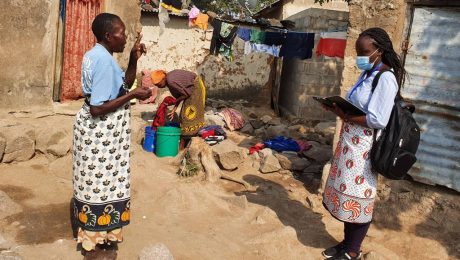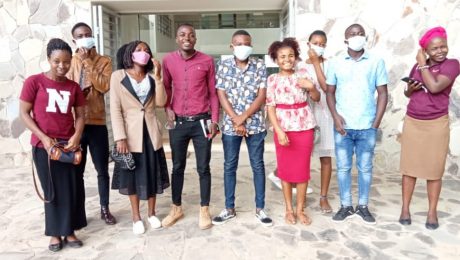MITU is carrying out research with young men to understand intimate partner violence in Mwanza city.

Male research assistant interviewing a young man using a tablet
MITU in collaboration with the London School of Hygiene and Tropical Medicine and Ludwig Maximilian University of Munich, Germany has received funding from the European Research Council to conduct a study among 1,000 young men aged 18-24 years in Mwanza city, Tanzania. The purpose of this study is to investigate the patterns and factors that cause intimate partner violence in the study population.
Between June and December 2021, young men from 24 streets across the city will be invited to take part in the study and those who agree to participate will be interviewed. A team of 9 researchers is carrying out the survey in the streets located in 6 wards in Nyamagana and Ilemela districts of Mwanza city. The interviews cover a range of topics about the lives of these young men and their views and understanding of the different forms of intimate partner violence, its causes and possible ways for preventing it.

The young man completing the interview himself on the tablets
The interviews are carried out using hand held computer tablets – a modern data collection technique. In some parts of the interviews, the young men are given the tablets and head phones to listen to the questions and enter the responses by themselves. This ensures that they are part of the research process and safeguards the confidentiality of their responses.
Dr. Gerry Mshana, a senior researcher at MITU and lead scientist for this study said: “Intimate partner violence is a major problem hindering the health, wellbeing and development of children, young people and adults in Tanzania and other parts of the world. We are very pleased for the opportunity to carry out this important and unique study to generate evidence from young men in Mwanza on the magnitude of the problem and their views about it. The results will increase our understanding of the problem and help in designing appropriate interventions and policies in Tanzania and in other similar low-income countries.”
On 26 May 2021, MITU started conducting a survey to collect data that will help to evaluate a reproductive health programme known as “Adolescent 360” or A360. The A360 programme was implemented by the Population Services International (PSI) in 10 regions in Tanzania mainland, including the Mwanza region, and was targeting girls aged 15 to 19 years.

The survey is being conducted in 15 wards of Ilemela district in Mwanza city. In each ward, two streets will be selected by lottery to participate in the study and later visited by trained female research assistants to identify households with girls aged 15 to 19 years. Once this exercise is completed, female research assistants will visit the homes of identified girls to inform them about the study, obtain their consent to participate in the study, and conduct a detailed interview in a private location. Research assistants will also separately interview a sample of adults who live with the interviewed girls. MITU would like to find out whether the A360 programme helped to improve what girls’ knew about family planning (ways to delay or prevent pregnancy), and whether the programme made it easier for girls’ to use family planning services if they wanted to avoid or delay getting pregnant.

More than 5,000 girls will be involved in this survey which is expected to be completed by the end of September 2021. MITU received funds to conduct this survey from the Bill and Melinda Gates Foundation and the Children’s Fund Foundation.


Joint Statement by the Heads of the World Bank Group, International Monetary Fund, World Health Organization, and World Trade Organization
The Heads of the World Bank Group, International Monetary Fund, World Health Organization, and World Trade Organization today convened for the first meeting of the Task Force on COVID-19 Vaccines, Therapeutics and Diagnostics for Developing Countries. They issued the following joint statement:
“As many countries are struggling with new variants and a third wave of COVID-19 infections, accelerating access to vaccines becomes even more critical to ending the pandemic everywhere and achieving broad-based growth. We are deeply concerned about the limited vaccines, therapeutics, diagnostics, and support for deliveries available to developing countries. Urgent action is needed now to arrest the rising human toll due to the pandemic, and to halt further divergence in the economic recovery between advanced economies and the rest.
We have formed a Task Force, as a “war room” to help track, coordinate and advance delivery of COVID-19 health tools to developing countries and to mobilize relevant stakeholders and national leaders to remove critical roadblocks—in support of the priorities set out by World Bank Group, IMF, WHO, and WTO including in the joint statements of June 1 and June 3, and in the IMF staff’s $50 billion proposal.
At today’s first meeting, we discussed the urgency of increasing supplies of vaccines, therapeutics, and diagnostics for developing countries. We also looked at practical and effective ways to track, coordinate and advance delivery of COVID-19 vaccines to developing countries.
As an urgent first step, we are calling on G20 countries to (1) embrace the target of at least 40 percent in every country by end-2021, and at least 60 percent by the first half of 2022, (2) share more vaccine doses now, including by ensuring at least 1 billion doses are shared with developing countries in 2021 starting immediately, (3) provide financing, including grants and concessional financing, to close the residual gaps, including for the ACT-Accelerator, and (4) remove all barriers to export of inputs and finished vaccines, and other barriers to supply chain operations.
In addition, to enhance transparency we agreed to compile data on dose requests (by type and quantity), contracts, deliveries (including through donations), and deployments of COVID-19 vaccines to low and middle-income countries—and make it available as part of a shared country-level dashboard. We also agreed to take steps to address hesitancy, and to coordinate efforts to address gaps in readiness, so countries are positioned to receive, deploy and administer vaccines.”

On 11th May 2021, a group of 10 second year undergraduate sociology students from St. Augustine University of Tanzania (SAUT), Mwanza branch visited our unit as part of the study tour. These students’ interest was to understand the contribution of the Mwanza Intervention Trials Unit (MITU) in solving public health problems.
After an official introduction and tour of MITU facilities, the group was invited for a discussion led by three scientists within the unit: Dr Elialilia Okello (Senior Social Scientist), Dr Kenneth Makata (Public Health Specialist) and Onike Mcharo (Social Scientist). The discussion adhered to proper COVID-19 preventive measures. During the discussion, students were given information about a range of research studies conducted in the Unit.
The students had a chance to ask questions to the researchers about MITU’s contribution in addressing public health problems. At the end of the discussion, the students provided positive feedback on their understanding of MITU’s roles and its contribution towards solving public health problems in the region.
Makata K, Ensink J, Ayieko P, Hansen C, Sichalwe S, Mngara J, Mcharo O, Mazigo H, Seni J, Dreibelbis R, Rockowitz S, Okello E, Grosskurth H, Kinung’hi S, Kapiga S.
BMC Med. 2021 May 21;19(1):125.
DOI: 10.1186/s12916-021-01987-6.
PMID: 34016091;
PMCID: PMC8139108.
Women’s Narratives about COVID-19, Preventive Practices and Sources of Information in Northwestern Tanzania.
Mchome Z, Mshana G, Peter E, Aloyce D, Kapiga S, Stöckl H.
International Journal of Environmental Research and Public Health. 2021;18(10):5261,
Gerry Mshana, Zaina Mchome, Diana Aloyce, Esther Peter, Saidi Kapiga and Heidi Stöckl.
PMID: 33902620
Nsanya MK, Ayieko P, Hashim R, Mgema E, Fitzgerald D, Kapiga S, Peck RN.
Sci Rep. 2021 Apr 16; 11(1):8397.
DOI: 10.1038/s41598-021-87996-0.
PMID: 33864003.
Hahn JA, Murnane PM, Vittinghoff E, Muyindike WR, Emenyonu NI, Fatch R, Chamie G, Haberer JE, Francis JM, Kapiga S, Jacobson K, Myers B, Couture MC, DiClemente RJ, Brown JL, So-Armah K, Sulkowski M, Marcus GM, Woolf-King S, Cook RL, Richards VL, Molina P, Ferguson T, Welsh D, Piano MR, Phillips SA, Stewart S, Afshar M, Page K, McGinnis K, Fiellin DA, Justice AC, Bryant K, Saitz R.
Alcohol Clin Exp Res. 2021 Apr 10.
DOI: 10.1111/acer.14611.
PMID: 33837975.







